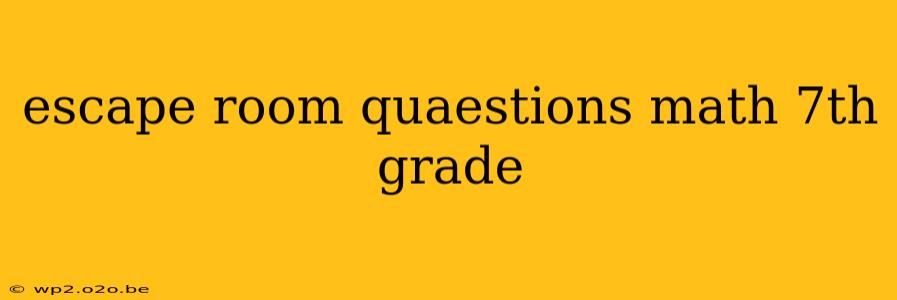This article provides a collection of math questions suitable for a 7th-grade escape room, categorized by difficulty and topic. These puzzles are designed to be engaging, challenging, and require collaborative problem-solving, perfect for fostering teamwork and critical thinking skills. Remember to adjust the difficulty based on your students' specific abilities.
Beginner Level: Building Confidence
These questions focus on foundational 7th-grade math concepts and provide a gentle introduction to the escape room challenge.
1. Order of Operations:
- Question: Solve the following equation: (15 + 3) x 2 – 4 ÷ 2 = ?
- Solution: 34
- Escape Room Integration: The solution could be a code to unlock a box, or a number needed to proceed to the next stage.
2. Fractions and Decimals:
- Question: Convert the fraction 3/5 to a decimal. Use this decimal to unlock the next clue.
- Solution: 0.6
- Escape Room Integration: The decimal could be a combination for a lock, or the solution could reveal a hidden message when placed in a specific location.
3. Percent Calculations:
- Question: A shirt costs $25. If it's on sale for 20% off, what is the sale price?
- Solution: $20
- Escape Room Integration: The sale price could be a key code, or represent a specific item in a larger puzzle.
Intermediate Level: Stepping Up the Challenge
These puzzles require a deeper understanding of 7th-grade math concepts and incorporate more problem-solving steps.
1. Proportions:
- Question: If a recipe calls for 2 cups of flour for every 3 cups of sugar, how many cups of sugar are needed if you use 6 cups of flour?
- Solution: 9 cups of sugar
- Escape Room Integration: This solution could be the key to opening a combination lock (9-3-6, for example), or a sequence for solving a further puzzle.
2. Geometry:
- Question: Find the area of a triangle with a base of 10 cm and a height of 6 cm. Use the area to unlock a digital lock.
- Solution: 30 cm²
- Escape Room Integration: The area could be a password or a part of a larger code.
3. Algebraic Equations:
- Question: Solve for x: 2x + 5 = 11
- Solution: x = 3
- Escape Room Integration: This solution can be a sequence, a location on a map, or part of a larger code to crack.
Advanced Level: Putting Skills to the Test
These challenges require advanced problem-solving and integration of multiple mathematical concepts.
1. Multi-Step Problem Solving:
- Question: A train travels at 60 mph for 2 hours, then at 40 mph for 3 hours. What is the average speed of the train over the entire journey?
- Solution: 48 mph
- Escape Room Integration: This solution could be a code, or a step needed for activating a mechanism within the room.
2. Data Analysis:
- Question: Using the provided bar graph (provide a simple bar graph with data related to a fictional scenario), determine which category represents the highest value. This answer unlocks a safe.
- Solution: The solution will depend on the data provided in the bar graph.
- Escape Room Integration: The solution should be directly related to the category identified in the graph.
3. Real-World Application:
- Question: You need to buy 3 notebooks for $4 each and 2 pens for $2 each. If you have a $20 bill, how much change will you receive?
- Solution: $6
- Escape Room Integration: The solution (or a slight variation of it) could be the combination to a lock or a hidden clue's location.
Tips for Creating an Engaging Escape Room
- Visual Cues: Use visual aids, like maps, diagrams, or symbols, to present the challenges in a more appealing way.
- Thematic Elements: Incorporate a theme (e.g., mystery, adventure, science fiction) to make the experience more immersive and enjoyable.
- Collaboration: Design puzzles that require teamwork to solve.
- Hints: Provide hints strategically placed throughout the room to help students if they get stuck.
- Time Limit: Setting a time limit will add a layer of excitement and urgency.
By carefully selecting and integrating these math questions into a well-designed escape room, you can create a fun and educational experience that reinforces 7th-grade mathematical concepts in a memorable way. Remember to always adjust the difficulty and complexity of the puzzles to match the specific abilities and knowledge of your students.

